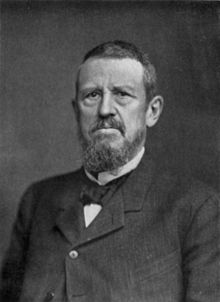Joseph Wharton
Joseph Wharton (born March 3, 1826 in Philadelphia , † January 11, 1909 ) was an American industrialist and a co-founder of the Bethlehem Steel Company.
Wharton had grown up in a liberal Quaker family that had joined the hicksite movement . The grandfather (Samuel R. Fisher) had made a fortune doing a parcel service between Philadelphia and London. The family owned a Philadelphia villa and a country house. Wharton's father was already living on interest and speculative profits without having a job.
Wharton first moved to Joseph and Abigail Walton's family farm near West Chester, Pennsylvania, after finishing school to learn about country life. He was an accomplished swimmer, rower, and rider. Wharton learned German and French and studied chemistry in the Martin Boyes laboratory. At the age of 19 he began an apprenticeship as an accountant. At the age of 21, he and his brother founded a company for the production of white lead . He laid the foundation of his later wealth from 1853 as the manager of a zinc mill, which he took over in 1857/58 in a difficult financial situation and made it profitable. In 1860 he began developing the first factory in the United States to manufacture metallic zinc for "Lehigh Zinc". He rented this factory for the next four years and made a fortune during the American Civil War .
In 1854 he married Anna Corbit Lovering. He devoted much of his life to his family and children.
In 1863 Wharton entered the nickel business and tirelessly built a corporate empire. He benefited from the ever higher nickel content of the currency. Over time, he acquired coal, gold, and silver mines in New Jersey, West Virginia, Arizona, and Nevada. As a supplier to the Bethlehem Steel Company, he made huge profits in railway construction, but also through profitable contracts with the US Navy, for which he manufactured armor plates and cannons.
In 1869 he was one of the founders of Swarthmore College . In 1881 he founded the University of Pennsylvania a "School of Finance and Economy", the Wharton School named after him , which was to devote itself exclusively to a policy of protective tariffs. For many decades, Wharton was also a successful lobbyist in Washington for protective tariffs .
literature
- Willard Ross Yates: Joseph Wharton: Quaker Industrial Pioneer. Bethlehem 1987, ISBN 0-934223-00-9 .
- Claus Bernet : Anniversaries and Commemorations 2009 - From early communists to large industrialists. In: Quäker , 5/2009, pp. 254-256, ISSN 1619-0394 .
- Claus Bernet: Wharton, Joseph. In: Biographisch-Bibliographisches Kirchenlexikon (BBKL). Volume 38, Bautz, Nordhausen 2017, ISBN 978-3-95948-259-2 , Sp. 1504-1509.
| personal data | |
|---|---|
| SURNAME | Wharton, Joseph |
| BRIEF DESCRIPTION | American industrialist , co-founder of the Bethlehem Steel Company |
| DATE OF BIRTH | March 3, 1826 |
| PLACE OF BIRTH | Philadelphia , Pennsylvania , USA |
| DATE OF DEATH | January 11, 1909 |
